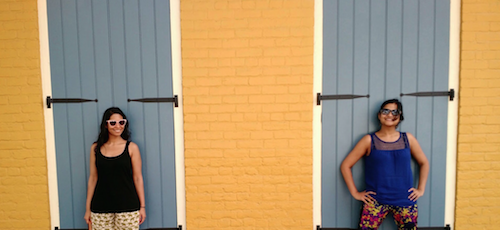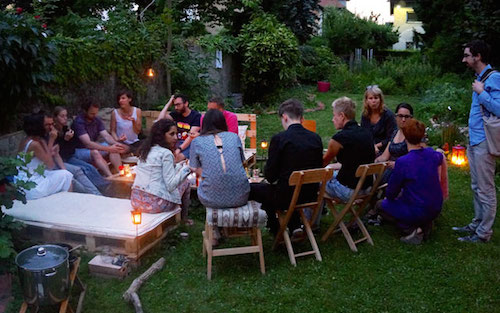
Food for Thought founders Geetika Agrawal and Anuja Joshi
Impresario is not often listed among the careers available to industrial designers. Then again, neither is chef, host or community organizer. But combine all those roles under the umbrella of entrepreneurial problem solving and you have the makings for a successful startup deeply rooted in ArtCenter’s Graduate Industrial Design (GradId) curriculum.
Food for Thought, the brainchild of Anuja Joshi (MS 09 GradID) and Geetika Agrawal (MS 04 GradID), is a digital portal curating events around the globe hosted by local cooks offering a menu of their favorite recipes. The result: a local solution to lonely planet ennui in the form of dinner parties satisfying a universal desire for community, good food and the wonder of discovery unique to exotic travel—minus the cost of airfare and lodging.
Not surprisingly, Food for Thought, has found some serious traction with wanderlusty foodies and adventurous flocking to events worldwide. Case in point: At the most recent gathering in Lisbon, Portugal, Manuel Nascimiento whipped up some of his favorite African-inflected dishes from his childhood for a sold out crowd.
Joshi and Agrawal’s traveling dinner party may not make it Pasadena for quite some time. So we tracked them down to answer a few questions about the origins of their intimate gatherings and their unorthodox approach to industrial design.

Food for Thought dinner event. Photo by Geetika Agrawal
Can you describe one (or two) recent project(s) completed in the last 1-3 years that have been especially noteworthy?
Geetika and Anuja: We would like to share our latest project Food For Thought: a dinner event created by travelers like us, for locals. As we travel around the world, we look for local hosts in each city who are willing to open the door to their home and kitchen. Then we find ingredients locally and prepare a home-cooked meal from different cultures for a small group of locals who sign up through the website.
We’ve had two events in Prague and Ljubljana, with Indian and Cajun/Creole food respectively. Hosts learned how to cook a new cuisine, guests enjoyed eating food that is hard to find in their city and the dinner conversations sparked new ideas in us all. We will be hosting our third event in Dubrovnik, Croatia with Brazilian food to satiate the local seafood lovers.
There are a lot of people innovating in the travel space catering to a traveler’s needs, but there’s nothing interesting for locals. We hope that Food For Thought will open a new area of travel ideas catering to locals.
What is the name of your company or place of employment and what is your job title?
Anuja: Until recently I worked as a design strategist for Material ConneXion in New York. Now I am a Trendspotter for Faith Popcorn’s BrainReserve and freelance designer while traveling and working remotely.
Geetika: I work as a creative director at R/GA, New York. Currently, I’m on a one year sabbatical working on my start-up ideas.
Where are you originally from? What city do you currently live in?
We are originally from India and until recently lived in New York. We are currently traveling and working through 12 cities in 12 months across Europe, Asia and South America.
Can you briefly describe your home life, upbringing or life experience as it was before attending Art Center?
Anuja: I grew up in Mumbai, India. A very busy and crowded city, I grew up in a life of hustle bustle, with entrepreneur parents and an upbringing steeped on strong Indian culture. I studied architecture and worked as an architect in Mumbai, working on hotels and residential buildings to corporate and residential interior design. In an effort to gain a more diverse design skill-set along with a business perspective, I sought out ArtCenter College of Design’s graduate Industrial design program. Moving to Pasadena was a culture shock: from tall buildings to deer on road; from hustle bustle to appreciating calm; from being one of the best to being one among many talented.
What are your most reliable and/or unlikely sources of inspiration?
Anuja: Traveling, people, blogs, Pinterest, Instagram and my husband
Geetika: Stories of entrepreneurs, women who are badass at work and play, people I meet during my travels, nature and handstands.
What do you do with your downtime in Greater LA (or current place of residence)?
Anuja: No matter what part of the world I am in, a glass of wine, cooking and intimate dinners with friends or strangers are my most favorite.
Geetika: Cook a healthy meal, share it with close friends, talk about life and dance.
What made you choose to attend ArtCenter?
Anuja: ArtCenter was reputed to be the best of the best for Industrial Design and it also fulfilled my criteria for a business in design program.
Geetika: ArtCenter Graduate Industrial Design program was a one-of-a kind program with a transdisciplinary and human-centered design approach. It was a new way of thinking and the only program where I could pursue my interest in combining design and technology in a meaningful way. Secondly, I was attracted to ArtCenter’s strong industry network and opportunities for collaborations with Caltech that ended up defining my future work and thinking. Lastly, it was in sunny California
What was your background prior to ArtCenter? Did you earn a previous degree or have previous work experience?
Geetika: I got a Bachelor’s in Interior Architecture from CEPT in Ahmedabad, India before attending ArtCenter. My only work experience was a six-month internship at an architectural firm in San Mateo, California and a set design project with a Bollywood art director in Mumbai.
What one (or two) lesson(s) did you learn at Art Center that have most benefited you as an artist?
Anuja: Teamwork and that design is not art. I work in non-designer teams now and I still use the techniques I learned in Grad ID of how to work with people and teams. Design is not art, design is logic, it is problem solving, it is creative thinking for the most part. If there was any artist in me, Grad ID got it out of me and I am eternally thankful for it.
Geetika: When teachers set high standards and you are surrounded by incredibly talented students, you have no choice but to learn two tough lessons: persistence and resilience. It goes into every great work that’s out there and it humbles me everyday.
Alumni often find themselves supporting the next generation of artists and designers by serving as “brand ambassadors,” hiring young alumni, offering internships, sponsoring projects, or donating money to scholarships, endowment and facilities improvements. Sometimes they simply stay connected with their local Alumni Chapter, attend events or enroll in the College’s Public Programs. How do you engage with ArtCenter now that you’re an alum?
Anuja: Get involved and stay connected to alumni chapter in New York
Geetika: Mentoring prospective, current students and young alumni; hiring opportunities; ArtCenter and R/GA partnerships; teach at initiatives like ArtCenter Create Change in Beijing.
What do you think the role of an artist or designer is in the 21st Century?
Geetika: With design becoming essential to every industry, artists and designers are defining culture and communities more than ever before. Therefore, one of our biggest roles is to ground our work in simplicity and truth and not get carried away by noise.
Who are your biggest creative influences or mentors?
Geetika: Nick Law – Global Chief Creative Officer at R/GA, New York
Chloe Gottlieb – SVP/ECD at R/GA, New York
Philip Van Allen – Faculty at ArtCenter College of Design
My peers.








